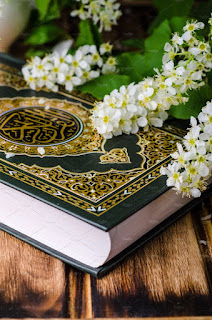The Noble Quran English Translation and Tafsir of Surah Al-Ma’rij Ayah 1-18
70:1 A questioner asked about an impending punishment.
70:2 For the disbelievers, which none can avert.
70:3 It is from Allah, the Lord of the ways of ascent.
70:4 The angels and the Spirit will ascend to Him on a day, the length of which is fifty thousand years.
70:5 Hence, be patient, goodly patience.
70:6 They see as it far off,
70:7 and We see it near.
70:8 On the day the sky will be like murky boiling oil,
70:9 and the mountains will be like wool,
70:10 and no friend will ask about a friend.
70:11 They will be made to see one another. The evildoer will wish to ransom himself from the punishment of that day by his children,
70:12 and his wife and his brother,
70:13 and his kindred who shelter him,
70:14 and those on earth all together, then it might deliver him.
70:15 No! It is a blazing fire,
70:16 stripping away the scalp,
70:17 calling him, who drew back and turned away,
70:18 and amassed and hoarded.
Tafsir
70:1 A questioner asked about an impending punishment.
Some disbelievers used to ask Messenger Muhammad [peace be upon him] about the Day of Judgment, on which they would suffer severe torment. Their inquiry was to ridicule and mock Messenger Muhammad and not to be prepared for that day. Allah says, interpretation of the meaning,
67:25 And they say, ‘When shall this promise come to pass if you are truthful?’
Some disbelievers used to ask Messenger Muhammad about the Day of Judgment and demand its occurrence out of stubbornness and arrogance.
The meaning of ayah [1] is as follows: A questioner mockingly asked Prophet Muhammad about the Day of Judgment and demanded its swift occurrence. That is because Prophet Muhammad used to warn the disbelievers of the severe punishment of Allah on the Day of Judgment if they insisted on disbelieving in the Oneness of Allah and following the path of misguidance.
The ayah mentions that the punishment of Allah is impending because it will certainly take place at the time that Allah has appointed for it.
70:2 For the disbelievers, which none can avert.
70:3 It is from Allah, the Lord of the ways of ascent.
A questioner asked about an impending punishment, which would befall the disbelievers. None can avert the punishment of Allah away from the disbelievers when the time of its occurrence comes. Allah, the Lord of the ways of ascent, will severely punish them for their insistence on disbelieving in His Oneness. Indeed, Allah is Great and characterized by all attributes of perfection. He is high above all creatures and His blessings on them are countless.
The scholars of Tafsir mention the following opinions about the meaning of ‘the Lord of the ways of ascent’: 1) The ways of ascent refer to the heavens. 2) They are the ways through which the angels ascend to heaven. Al-Ma’rij is the plural form of maraj ‘ladder, stairs, and ways of ascension. It refers to the way through which the deeds of people ascend to heaven, and it may mean blessings and bounties. That is because the blessings and bounties of Allah reach people on different levels.
Reflecting ‘on the Lord of the ways of ascents’, one visualizes in his mind the greatness of Allah and the many levels of becoming close to the pleasure and reward of Allah.
70:4 The angels and the Spirit will ascend to Him on a day, the length of which is fifty thousand years.
The Spirit refers to the archangel Gabriel. He is specifically mentioned because of his high rank among the angels.
The angels and the archangel Gabriel will ascend to Allah, Exalted be He, on a day, the length of which is fifty thousand years of the life of this world that people will take if they want to ascend to heaven.
Some scholars of Tafsir maintain that the day whose length is fifty thousand years is the Day of Judgment from the time that people will be resurrected until reckoning and recompensing people for their deeds end. Other scholars believe that the day whose length is fifty thousand years refers to the time that others than the angels will need if they want to ascend to heaven from the earth to the Throne of Allah, Exalted be He.
Abu Said Al-Khudri, may Allah be pleased with him, said, ‘70:4 The angels and the Spirit will ascend to Him on a day, the length of which is fifty thousand years.’ It will be a very long day. Then, Messenger Muhammad [peace be upon him] said, ‘By the One in whose Hand is my soul, it will be very short for the believer that it will be shorter than the time he takes to pray an obligatory prayer.’
Abdul Allah Ibn Abbas, may Allah be pleased with him, was asked about the day whose length is fifty thousand years. He said, ‘There are two days that Allah, Exalted be He, mentions, and He only knows best about them. And I hate to say about something in the Book of Allah, which I do not know.’
70:5 Hence, be patient, goodly patience.
70:6 They see as it far off,
70:7 and We see it near.
Goodly or beautiful patience means being patient with the affliction while complaining only to Allah without being anxious or impatient with the decree of Allah, Exalted be He.
O noble Messenger Muhammad, the disbelievers asked you about the occurrence of the Day of Judgment and its punishment. Their inquiry was out of stubbornness and arrogance. Hence, be patient with their ignorance. Complain only to your Lord, Allah, and do not worry. Keep on conveying the message of Islam. Allah will give you and your followers victory. The disbelievers think that the Day of Judgment and its punishment are far off or even will never take place. But your Lord, Allah, sees it near and will happen soon no matter how long it takes it to take place. The Day of Judgment will happen at its appointed time without any delay according to the wisdom and will of your Lord, Allah.
70:8 On the day the sky will be like murky boiling oil,
70:9 and the mountains will be like wool,
70:10 and no friend will ask about a friend.
On the Day of Judgment, the appearance of the sky will change. It will be weak like murky boiling oil after it was firm. The shape of the mountains will also change. They will be destroyed and they will be like carded wool that flies here and there. The universe will change completely on the Day of Judgment and the relationship between people will change on that day. No friend will ask about a friend. In the life of this world, friends normally help one another, especially in times of hardship. However, every person will only be worried about his safety on the Day of Judgment and he will never think about his best friend. Indeed, it will be a difficult day and only sincere belief in the Oneness of Allah and righteous deeds done for Allah’s sake will be beneficial then.
70:11 They will be made to see one another. The evildoer will wish to ransom himself from the punishment of that day by his children,
70:12 and his wife and his brother,
70:13 and his kindred who shelter him,
70:14 and those on earth all together, then it might deliver him.
Ayah [10] says that no friend will ask about a friend and each person will think only about himself. Someone may ask, ‘Why does a friend not ask about the condition of his friend on the Day of Judgment? Can he not see his friend and know his condition?’ Each person will see his friend and his close relatives on the Day of Judgment. He will see his children, his wife, his brother, and his kindred. However, every one of them will be concerned about his affairs and will think only about how he can save himself from the punishment of Hell. The evildoer will wish to ransom himself from the punishment of Hell on the Day of Judgment even by his children, his wife, his brother, his kindred, and all those on earth to save himself from the painful torment of Hell.
70:15 No! It is a blazing fire,
70:16 stripping away the scalp,
70:17 calling him, who drew back and turned away,
70:18 and amassed and hoarded.
No! The evildoer will never be saved from the punishment of Hell no matter what he may offer. The blazing fire of Hell is waiting for the evildoer. It will strip away the scalp and the extremities. Then the skin and the extremities will return to their former condition and this process will be repeated time and again.
The blazing fire of Hell will call him, who drew back and turned away from the truth and path of guidance and followed the path of misguidance. He also amassed and hoarded his wealth and refrained from giving the needy the rights that Allah assigned for them.
Imam Ibn Kathir, may Allah have mercy on him, said, ‘The blazing fire of Hell will call its dwellers whom Allah created to be its inhabitants. On the Day of Judgment, it will call them and pick them, as the bird picks grains. That is because their hearts disbelieved in the truth and their limbs refrained from performing righteous deeds. They also amassed and hoarded their wealth and desisted from paying the obligatory rights on it.’
Learned Lessons from Al-Ma’rij Ayah 1-18
• It is prohibited to demand the coming of the punishment. Indeed, the punishment of Allah is severe and no one can bear it. Thus, one should ask for the mercy of Allah and safety.
• The disbelievers of Makkah demanded the coming of the punishment of Allah from Messenger Muhammad to mock and ridicule him.
• The punishment of Allah, the Lord of the ways of ascent, will certainly befall the disbelievers, but it will take place at the time that Allah has appointed to it.
• It is obligatory to be patient concerning obeying Allah’s commands, and when afflictions befall without showing resentment or displeasure.
• Confirming that the Day of Judgment will take place and people will be resurrected on that day for reckoning and recompense for their deeds.
• The horrors of the Day of Judgment are great. Some of which are the sky will be like murky boiling oil, the mountains will be like carded wool, and every person will only be concerned about his affairs.
• The evildoer will hope to ransom himself from the punishment of Allah by his close relatives, but nothing will save him from the severe torment of Allah.
• Criticizing those who turn away from obeying the commands of Allah and His Messenger Muhammad, and amass and hoard their wealth to deprive the needy of their rights.


.jpg)
